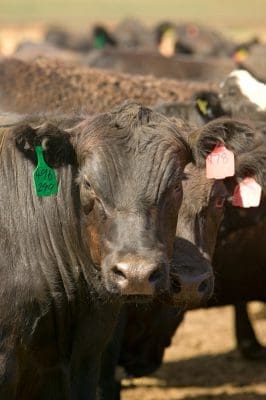IN A world first for the beef cattle industry, research undertaken by Angus Australia and the CSIRO has resulted in the development of the breeding index value, ImmuneDEX.
 Angus Australia and the CSIRO have partnered for some years to undertake research into genetic traits related to
Angus Australia and the CSIRO have partnered for some years to undertake research into genetic traits related to
immune competence and resilience in beef cattle.
Announced at the Angus through the Ages National Conference in Albury this afternoon, ImmuneDEX is a genetic description of an animal’s ability to react to an immune system challenge, such as disease.
Over the course of a number of years, the collaborative research has examined immune competence test calves from the Angus Sire Benchmarking Program, with the research co-funded by the
Australian Lot Feeders Association via Meat & Livestock Australia.
To develop the ImmuneDEX breeding value, immune competence phenotypes were collected on about 3000 Angus steers and heifers at weaning and analysed. This information, combined with genotypes (DNA Profiles) was analysed to determine genetic parameter estimates (heritabilities and correlations) and to produce Research Breeding Values for immune competence.
Angus Australia Strategic Projects Manager, Christian Duff, said while there was still more research to be undertaken to further develop the ImmuneDEX breeding value and validate its potential to deliver health benefits to industry, this development was a definite stride for Angus breeders and the broader beef industry.
Disease incidence during lotfeeding phase
On a subset of 900 steers from the study, disease incidence during feedlot feeding was examined.
Findings showed that animals with a superior immune competence phenotype had significantly lower health related
costs and mortality rates. Importantly, the genetic strategy is expected to assist in reducing the use of antibiotics,
improving overall welfare and health of the animal, and maintaining consumer confidence.
While still in its early research stages, the information now available through the ImmuneDEX breeding value will
assist beef producers make decisions about what the best animals are to breed from into the future with the goal of
improving animal health while simultaneously improving productivity.
Dr Brad Hine, Research Scientist at CSIRO explained the perspective long term benefits of the ImmuneDEX research findings.
“We know if we continue breeding with a sole focus on production a consequence we will inadvertently increase
susceptibility to disease and associated antibiotic use.”
“We envisage that ImmuneDEX will provide a long-term strategy to help address this problem by allowing the
producer to put selection emphasis on the immune competence of animals and put that into our selection thinking
to breed animals that are both productive and have a better ability to resist disease challenges.”
The ImmuneDEX value is moderately heritable and weakly negatively correlated with some production traits (eg
carcase weight) while being weakly favourably correlated with stress-coping ability and temperament related traits.
A list has been compiled by Angus Australia of the sires in the ASBP rated on their ImmuneDEX value according to
the research undertaken on their progeny. The list is available at www.angusaustralia.com.au



Finally.
An index that Means Cash for cattle.
Those that have never seen a needle and will never need to are worth anywhere from $100 to $200 per calf More Money.
Heck cows that throw those calves are worth say $400 to $500 per cow More Money.
Congratulations Angus Australia and Dr. Brad Hine for this great accomplishment. Genetic improvement of health is the next frontier in genetic improvement and this development is going to be of significant benefit for the Angus breed.
Dr. Stephen Miller, Genetic Research Director, American Angus Association